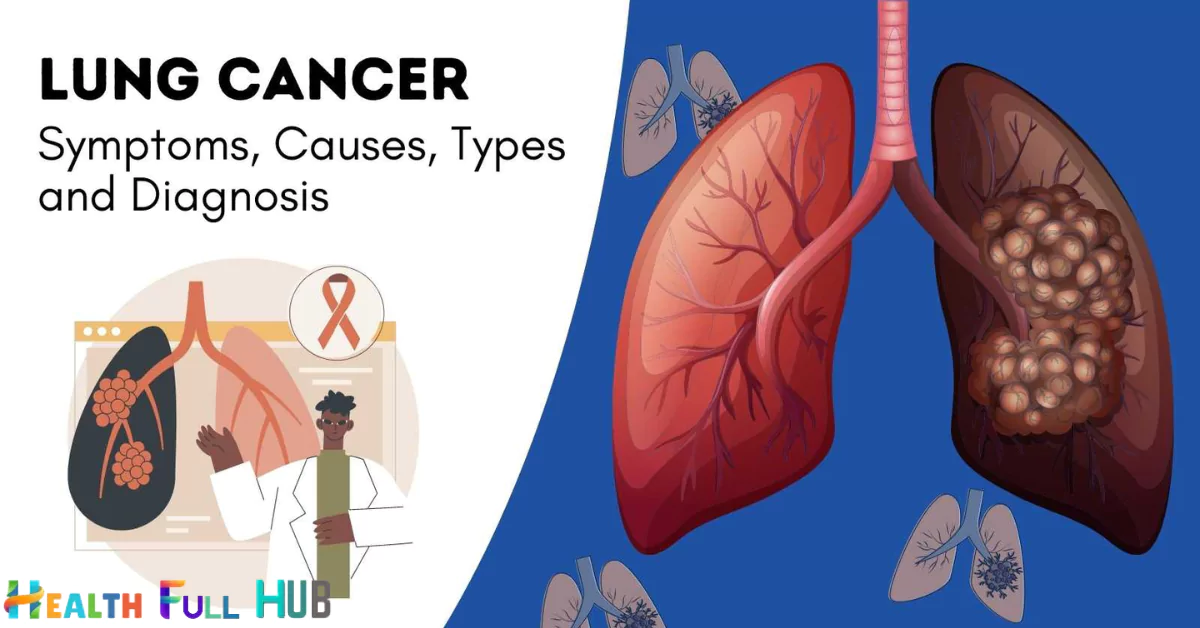Introduction
Lung Cancer Symptoms Because of its sometimes mild early signs, lung cancer continues to be one of the most difficult cancers to treat. Effective therapy depends on early discovery. People can potentially save lives by seeking timely medical counsel when they are aware of the warning indications.

Common Symptoms of Lung Cancer
Symptoms of lung cancer might differ greatly based on the type and stage. The following are a few of the most typical signs to watch out for:
Persistent Cough
One of the first indications of lung cancer may be a persistent cough that lasts longer than a few weeks. Although respiratory illnesses are frequently associated with coughs, a persistent cough that doesn’t go away could be a sign of a more serious problem. Keep an ear out for any changes in the frequency or tone of your cough, especially if it is harder or deeper.
Shortness of Breath
As a tumor grows, it may clog airways or cause fluid to accumulate in the lungs, which can result in shortness of breath or difficulty breathing. At first, this sensation may appear moderate and is frequently confused with physical weariness or aging. However, it’s imperative to get medical help if breathing becomes increasingly difficult with little effort.
Chest Pain
Lung cancer-related chest pain can range in intensity from mild to severe can be experienced continuously or sporadically. Usually, deep breathing, coughing, or laughing are linked to this pain. Additionally, the tumor pressing against surrounding tissues or the malignancy spreading to the chest wall might cause discomfort in the chest.
Unexplained Weight Loss
Weight loss without dietary or exercise modifications may be a precursor to lung cancer or other malignancies. Unexpected weight loss may result from the increased energy expenditure of cancer cells. Although this symptom might not appear concerning at first, it may be a sign of a more serious problem, especially if it is present in conjunction with other symptoms.
Additional Symptoms That May Signal Lung Cancer
As lung cancer progresses, other symptoms may appear. It’s important to understand the full range of possible symptoms.
Fatigue
Patients with lung cancer frequently report feeling especially exhausted or suffering fatigue. Cancer-related fatigue, in contrast to ordinary fatigue, can be debilitating and unrelieved by rest. Many cancers have this symptom, which might linger even in cases when other symptoms are not severe.
Coughing Up Blood (Hemoptysis)
Coughing up blood, no matter how much or how little, is frequently a dangerous sign of lung cancer. Blood in sputum should be treated right away, even if it may be linked to other illnesses.
Hoarseness or Voice Changes
If you notice hoarseness or a change in your voice that lasts more than a few weeks, it could indicate lung cancer. Tumors can put pressure on the nerves that control vocal cords, causing changes in voice.
Understanding Risk Factors
Being aware of the symptoms of lung cancer can save lives, particularly for those who have risk factors. Smoking is the main risk factor, accounting for around 85% of instances of lung cancer. However, exposure to secondhand smoke, air pollution, or a family history of the disease can also cause lung cancer in nonsmokers.
Importance of Early Detection
Lung cancer survival rates and treatment options are greatly increased by early diagnosis. Lung cancer can be identified in its early stages with routine screenings, particularly for high-risk patients.
Conclusion
Early intervention for lung cancer requires an understanding of its signs. It’s critical that you get medical help right away if you or someone you know suffers from any of these symptoms. Understanding the symptoms is the first step in combating lung cancer, and early detection and treatment can significantly improve results.
Frequently Asked Questions About Lung Cancer Symptoms
1. What are the first signs of lung cancer?
Shortness of breath, chronic coughing, and inexplicable weight loss are frequently the first indications of lung cancer. Over time, these symptoms may become increasingly apparent, albeit they may start out modest.
2. Can lung cancer develop without symptoms?
Indeed, especially in its early stages, lung cancer can develop in silence. For people who are more vulnerable, such smokers or those who are around secondhand smoke, routine screenings are essential.
3. How is a persistent cough different in lung cancer?
A lung cancer-related cough tends to be chronic, lasting several weeks or longer, and may become deeper or harsher. Sometimes, it may produce blood-tinged mucus.
4. Is chest pain a common symptom of lung cancer?
Yes, chest pain can be a symptom, especially if it worsens with deep breathing, coughing, or laughing. The pain may result from a tumor pressing on surrounding structures.
5. Can non-smokers get lung cancer?
Yes, while smoking is the leading cause, non-smokers can develop lung cancer due to other factors such as secondhand smoke exposure, environmental pollutants, and genetic factors.
6. When should I see a doctor for lung cancer symptoms?
If you experience a persistent cough, shortness of breath, chest pain, or unexplained weight loss for more than a few weeks, it’s wise to consult a healthcare provider. Early detection improves the chances of successful treatment.
7. Can lung cancer symptoms be mistaken for other illnesses?
Yes, symptoms like cough and fatigue can resemble those of respiratory infections or even aging. This overlap makes awareness and monitoring of persistent symptoms important for early diagnosis



